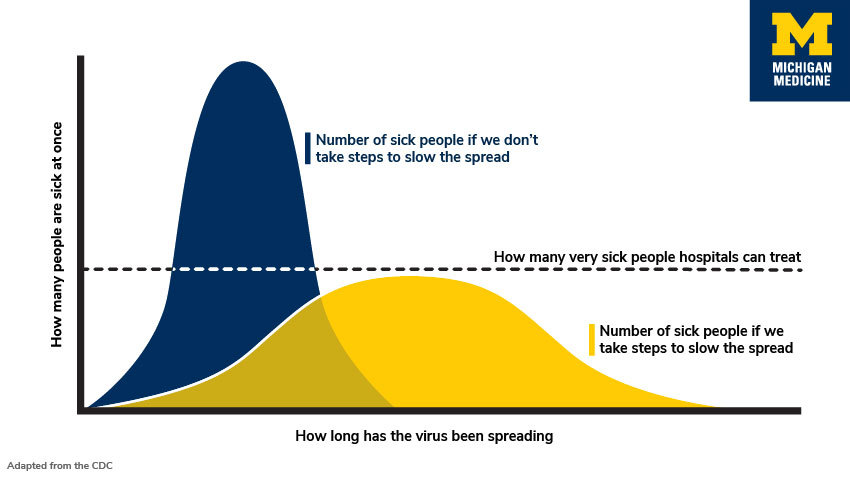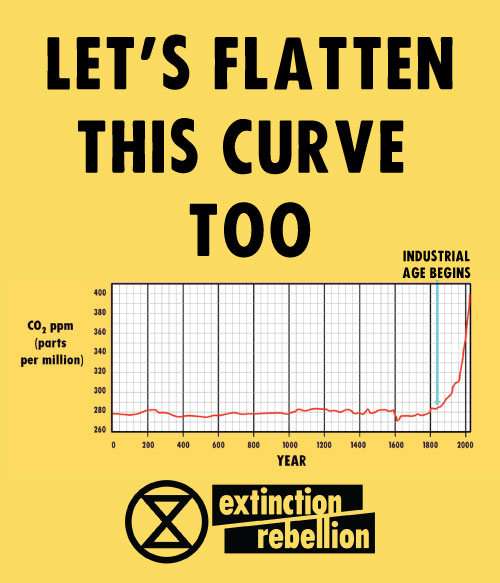OPINION: CLIMATE CHANGE AND CORONAVIRUS ARE RELATED

Voyageurs National Park in Minnesota. Photo: Student Conservation Association.

COVID-19 has certainly claimed our attention, and appropriately so. I hope you are healthy, following the guidance of the CDC, and finding ways to connect with people from a distance. While the virus may have pushed climate change out of the front of our minds, I think there’s plenty to be gained by thinking about these two crises together.
Even before the response to the coronavirus was to cancel sports events, ban meetings, shut businesses, and require physical distancing, it became clear that how we each of us conducted ourselves could have a major impact on other individuals and on how widely and quickly the disease spread. The idea of “flattening the curve” caught on as versions of this graphic went viral.

Prioritizing the Common Good
Our individual behaviors, combined with appropriate government action, could make the difference between a nightmare in which our healthcare system is so overwhelmed it can’t care for all the people who need hospitalization and large numbers die unnecessarily, and a much slower spread of the disease that could be better handled and would result in fewer deaths. A great many people quickly took this seriously and took action to ensure that they would not spread the disease, even if they didn’t have symptoms or feel personally at risk. (Whether we got this information in time, enough people acted on it, or the government action was sufficient to prevent the worst case scenario remains to be seen as I write this.)
Nonetheless, this type of thinking—including caring about others and modifying our behaviors appropriately—grew much more common all of a sudden. If we can learn this type of thinking in the coronavirus crisis, it could really help us with the climate crisis. Perhaps we can help people notice the pro-survival nature of taking a crisis seriously, caring about how others are affected, and being willing to inconvenience ourselves and change our behaviors for the benefit of all. I don’t expect to ever be grateful for the coronavirus, but learning from it could be critical to success in stopping climate change.
Something Hopeful
One of my family members pointed out just the other day that one of the things that she finds hopeful in the coronavirus crisis is that it has proved that huge numbers of people can change their habits dramatically, virtually overnight, to meet a public crisis and contribute to the good of all. This is good news for the changes we need to make to stop climate change.
I love it when creative people take on key issues. This graphic showing the level of CO2 in the air over the last 2000 years, from a local Extinction Rebellion chapter, is one of my new favorites.

Economic Activity and Climate Change
The slowing of economic activity in response to the coronavirus in China and Italy, in particular, has been so great that it has significantly reduced greenhouse gas emissions, as has the big reduction in air travel. That’s a significant (although temporary) help with climate change. At the same time, the shutting of businesses and requiring people to stay home, in the U.S. and elsewhere, creates tremendous hardships for workers who can’t do their work from home. Financial insecurity for millions is one of the severe effects of the coronavirus crisis. I think what we are seeing is evidence that we could really slow climate change by reducing industrial output and unnecessary consumption over the next decade, but we will need to do it by transitioning workers into green jobs and service jobs that meet real human needs and redistributing income so that poor and working families can benefit, rather than pay more than their share of the costs.
News Media
A young climate activist friend recently shared a slightly humorous current meme: “Climate change should get the same publicist that the coronavirus has.” The virus crisis is sure getting lots of attention.
It’s possible (at least theoretically) that our news media could learn a great deal about how to cover the climate crisis from the way they’ve handled the coronavirus crisis. Although the virus coverage has been flawed, to be sure, it has included daily headlines about the extent of the crisis, how many people are dying in all parts of the world, what causes the virus to spread, what people can do about it, what governments are doing and what they could be doing, and what we in the U.S. could learn from other countries. Imagine if the climate crisis was covered the same way—with daily front page headlines and multiple stories every day about all the same aspects of the climate crisis and humanity’s response to it. Let’s start now to demand that of all our news outlets.
The Same Systemic Problems Are Behind Both Crises
The coronavirus is starkly showing some of the worst problems with our current economic and governmental systems. The successful efforts of the right wing in the United States over the last many years to shred the safety net, impose “austerity” measures, prevent universal health care, weaken government’s role in addressing social problems, redistribute income to the wealthy at the expense of working people, put science deniers into public office, and make the government primarily responsive to the will of the wealthy, have all left us ill-prepared to deal with this current health crisis.
These same features have left us without the leadership or will to do what needs to be done in the face of the climate crisis. However, now more than ever, people are waking up to the need for an open, responsive, smart government that faces and tells the truth and is dedicated to the common good. Let’s not be shy about speaking up, clarifying these connections, and supporting this awakening.
Russ Vernon Jones blogs regularly on climate justice at www.RussVernonJones.org
